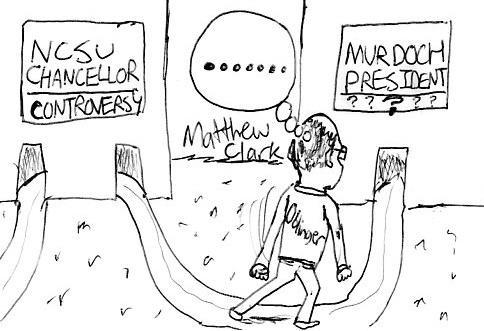The Facts: N.C . State has hired former chancellor, James Oblinger , to be the president of a new research institute. Oblinger stepped down as chancellor in 2009 due to controversial actions with hiring Mary Easley.
Our Opinion: The University was fooled once by Oblinger , if it happens a second time we are to blame.
The University has hired former chancellor, James Oblinger , as President of the David H. Murdock Research Institute in Kannapolis , NC. The university should remember the reason he left in the first place, and should watch him carefully to ensure nothing of the sort transpires again.
Oblinger resigned the day key documents to the hiring of then-first-lady Mary Easley were released to the public. Oblinger claimed not to have had a hand in the decision to hire Easley; however, the emails between him and the then-provost Larry Nielsen on the issue proved otherwise.
Oblinger allowed the hiring of Easley to an $80,000-a-year position as an executive in-residence and senior lecturer. Oblinger also provided his provost, Nielsen, a severance that possibly violated University policy, but triggered an emergency Board of Trustees meeting. Any man who is able to incite such controversy should be questionable for any employer; however, for N.C . State, we welcomed him back with open arms.
Oblinger will be president of a new research institution meant to lead N.C . State into biological systems research. This is another chance for N.C . State to grow and learn, and we shouldn’t jeopardize that because of hiring an ex-chancellor.
It is the University’s responsibility to ensure this doesn’t happen again. They hired him back, even though he resigned amidst public and media scrutiny. N.C . State found someone familiar to not only the University itself, but also the content. While Oblinger , with his Ph.D . in food technology, can benefit the research done at David H. Murdock, his experience as being a part of a research institution is limited.
His career prior to N.C . State has been the associate dean and director of Resident Instruction at the University of Missouri and a professor of food science and human nutrition at the University of Florida. This may give him administrative credibility, but if it benefits the research done at the Murdock institute is still up for debate.
This decision is not necessarily a poor one; however, if past behavior is the best predictor of future behavior, administration might want to rethink their decision to hire such a controversial candidate for the position.








